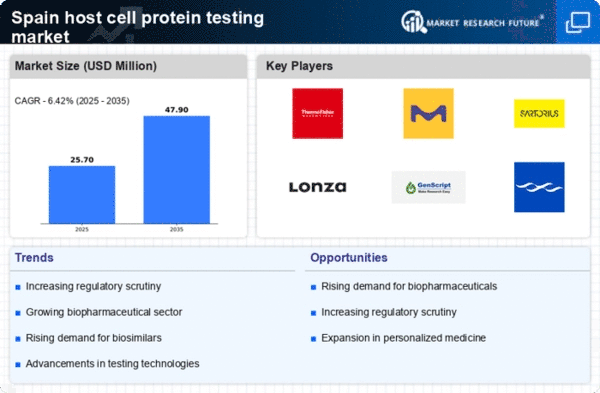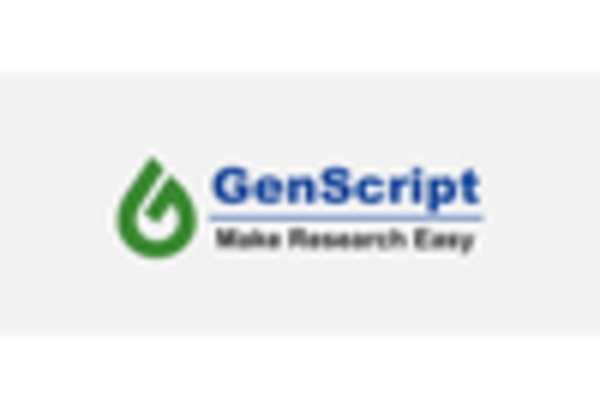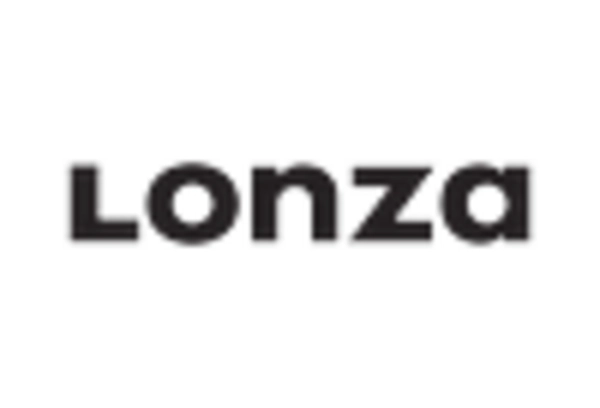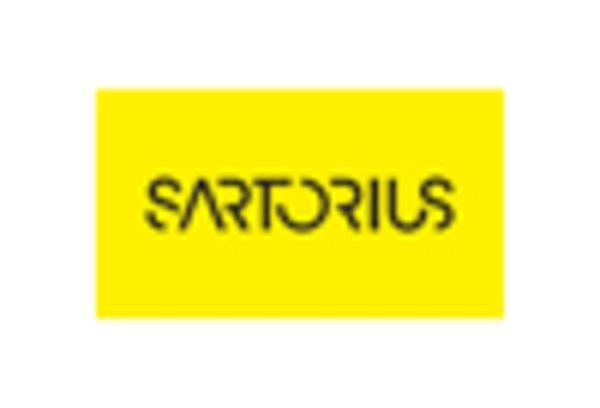Rising Demand for Biologics
The increasing demand for biologics in Spain is a primary driver for the host cell-protein-testing market. As the biopharmaceutical sector expands, the need for effective testing methods to ensure the safety and efficacy of biologics becomes paramount. In 2025, the Spanish biopharmaceutical market is projected to reach approximately €5 billion, indicating a robust growth trajectory. This surge necessitates rigorous testing protocols to identify host cell proteins that may affect product quality. Consequently, companies are investing in advanced testing technologies to meet regulatory standards and consumer expectations. The host cell-protein-testing market is thus positioned to benefit from this growing demand, as manufacturers seek to enhance their testing capabilities to comply with stringent regulations and ensure the safety of their biologics.
Increased Focus on Quality Control
Quality control remains a critical aspect of the host cell-protein-testing market in Spain. With the rise of biologics, there is an intensified focus on ensuring that these products are free from contaminants, including host cell proteins. Regulatory bodies in Spain are enforcing stricter guidelines, compelling manufacturers to adopt comprehensive testing strategies. The market for quality control testing is expected to grow by approximately 15% annually, reflecting the industry's commitment to maintaining high standards. This emphasis on quality not only safeguards public health but also enhances the reputation of biopharmaceutical companies. As a result, the host cell-protein-testing market is likely to see increased investments in innovative testing solutions that can provide accurate and timely results, thereby supporting the overall quality assurance processes.
Technological Innovations in Testing
Technological innovations are reshaping the landscape of the host cell-protein-testing market in Spain. The advent of advanced analytical techniques, such as mass spectrometry and high-performance liquid chromatography, has significantly improved the sensitivity and specificity of host cell protein detection. These innovations enable faster turnaround times and more reliable results, which are crucial for biopharmaceutical companies aiming to expedite their product development cycles. The market is witnessing a shift towards automation and high-throughput testing methods, which can enhance efficiency and reduce operational costs. As a result, the host cell-protein-testing market is expected to experience substantial growth, driven by the adoption of these cutting-edge technologies that facilitate compliance with regulatory requirements and improve overall testing accuracy.
Expansion of Research and Development Activities
The expansion of research and development (R&D) activities in Spain is a significant driver for the host cell-protein-testing market. With an increasing number of biopharmaceutical companies investing in R&D, there is a growing need for robust testing methodologies to support the development of new therapeutics. In 2025, R&D spending in the Spanish biopharmaceutical sector is anticipated to exceed €1 billion, highlighting the commitment to innovation. This investment translates into a higher demand for host cell-protein testing services, as companies seek to ensure that their products meet the necessary safety and efficacy standards. Consequently, the host cell-protein-testing market is likely to thrive as R&D activities continue to expand, necessitating comprehensive testing solutions to support the development pipeline.
Regulatory Landscape and Compliance Requirements
The evolving regulatory landscape in Spain significantly impacts the host cell-protein-testing market. Regulatory agencies are continuously updating their guidelines to ensure the safety and efficacy of biopharmaceutical products. Compliance with these regulations is essential for market access, prompting companies to invest in reliable testing methods. The host cell-protein-testing market is experiencing growth as manufacturers seek to align their processes with the latest regulatory requirements. In 2025, it is estimated that compliance-related expenditures in the biopharmaceutical sector will account for approximately 10% of total operational costs. This trend underscores the importance of effective testing strategies in maintaining compliance and ensuring product quality. As a result, the host cell-protein-testing market is likely to see increased demand for services that facilitate adherence to regulatory standards.
















